名利场的翻译
- 格式:ppt
- 大小:654.00 KB
- 文档页数:5
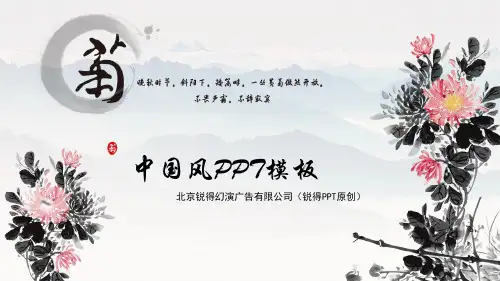
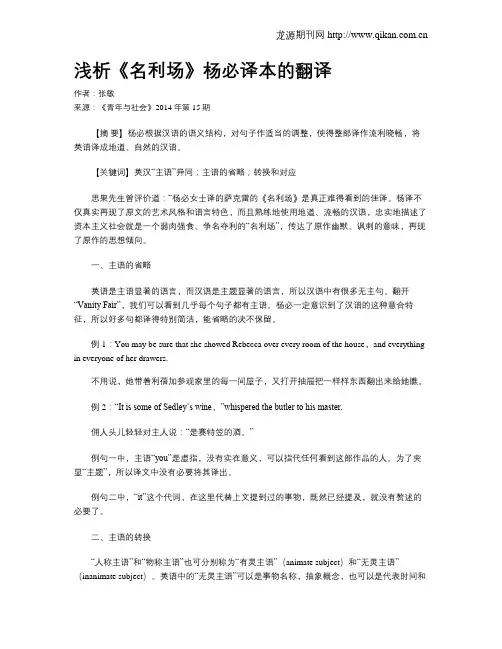
浅析《名利场》杨必译本的翻译作者:张敏来源:《青年与社会》2014年第15期【摘要】杨必根据汉语的语义结构,对句子作适当的调整,使得整部译作流利晓畅,将英语译成地道、自然的汉语。
【关键词】英汉“主语”异同;主语的省略;转换和对应思果先生曾评价道:“杨必女士译的萨克雷的《名利场》是真正难得看到的佳译。
杨译不仅真实再现了原文的艺术风格和语言特色,而且熟练地使用地道、流畅的汉语,忠实地描述了资本主义社会就是一个弱肉强食、争名夺利的“名利场”,传达了原作幽默、讽刺的意味,再现了原作的思想倾向。
一、主语的省略英语是主语显著的语言,而汉语是主题显著的语言,所以汉语中有很多无主句。
翻开“Vanity Fair”,我们可以看到几乎每个句子都有主语。
杨必一定意识到了汉语的这种意合特征,所以好多句都译得特别简洁,能省略的决不保留。
例1:You may be sure that she showed Rebecca over every room of the house,and everything in everyone of her drawers.不用说,她带着利蓓加参观家里的每一间屋子,又打开抽屉把一样样东西翻出来给她瞧。
例2:“It is some of Sedley’s wine,”whispered the butler to his master.佣人头儿轻轻对主人说:“是赛特笠的酒。
”例句一中,主语“you”是虚指,没有实在意义,可以指代任何看到这部作品的人。
为了突显“主题”,所以译文中没有必要将其译出。
例句二中,“it”这个代词,在这里代替上文提到过的事物,既然已经提及,就没有赘述的必要了。
二、主语的转换“人称主语”和“物称主语”也可分别称为“有灵主语”(animate subject)和“无灵主语”(inanimate subject)。
英语中的“无灵主语”可以是事物名称,抽象概念,也可以是代表时间和地点的名词,还可以是表外因和工具的词;而汉语要表达同样的意思却往往直接用人来作主语。
![[英国文学作品]英国文学](https://uimg.taocdn.com/d32b940017fc700abb68a98271fe910ef12dae45.webp)
[英国文学作品]英国文学英国文学篇(1):10部英国经典小说10. 《名利场》Vanity Fair (William Makepeace Thackeray, 1848)威廉·梅克皮斯·萨克雷,1848年出版这部小说的主角或许就是英国文学史上最知名的非正统派女主角——贝奇·夏普,小说的情节围绕阶级、社会、跻身上流社会以及现代读者听来又熟悉又害怕的金融危机。
《名利场》这些要素全都具备, 讲述那个年代,也讲述着每一个年代。
9. 《科学怪人》Frankenstein (Mary Shelley, 1818)玛莉·雪莱,1818年出版这部先锋作品集科幻和哥特式恐怖于一身,营造了一个难以磨灭的“恶魔”主题,即科学家中的“现代普罗米修斯”,几世纪以来经久不衰。
8. 《大卫·科波菲尔》David Copperfield (Charles Dickens, 1850)查尔斯·狄更斯,1850年出版David Copperfield is populated by some of the most vivid characters ever created. They are as much a part of readers’ world, and their way of thinking about the world, as people they have actually met.《大卫·科波菲尔》人物形象众多,性格鲜活的角色云集。
这些人物角色仿佛是读者所在真实世界的一部分,和读者亲身遇见的人一样,有着相似的世界观。
7. 《呼啸山庄》Wuthering Heights (Emily Bront, 1847)艾米莉·勃朗特,1847年出版《呼啸山庄》“蕴含巨大的心理能量,没有其它书籍能够与之匹敌。
”读者推崇《呼啸山庄》是因为其“层层叠叠的叙述结构”和丰富惊人的想象力,更因为《呼啸山庄》超越了爱情故事本身,展现了我们转瞬即逝的欲望之下“永恒的震撼”。
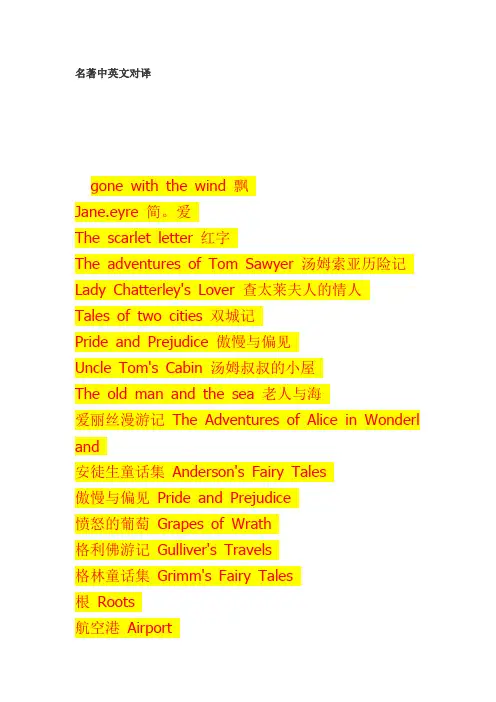
名著中英文对译gone with the wind 飘Jane.eyre 简。
爱The scarlet letter 红字The adventures of Tom Sawyer 汤姆索亚历险记Lady Chatterley's Lover 查太莱夫人的情人Tales of two cities 双城记Pride and Prejudice 傲慢与偏见Uncle Tom's Cabin 汤姆叔叔的小屋The old man and the sea 老人与海爱丽丝漫游记The Adventures of Alice in Wonderl and安徒生童话集Anderson's Fairy Tales傲慢与偏见Pride and Prejudice愤怒的葡萄Grapes of Wrath格利佛游记Gulliver's Travels格林童话集Grimm's Fairy Tales根Roots航空港Airport呼啸山庄Wuthering Heights环绕世界八十天Around the World in Eighty Days嘉丽妹妹Sister Carrie简·爱Jane Eyre罗滨逊漂流记Robinson Crusoe名利场Vanity Fair牛虻The Gadfly飘(乱世佳人)Gone with the Wind圣经的故事The Story of the Bible双城记A Tale of Two Cities苔丝姑娘Tess of the D' ubervilles天方夜谭(Tales from) The Arabian Nights汤姆叔叔的小屋Uncle Tom's Cabin汤姆索亚历险记The Adventures of Tom Sawyer 王子与贫儿The Prince and the Pauper雾都孤儿Oliver Twist伊索寓言Aesop's Fables远大前程The Great Expectations月亮宝石The Moonstone最后的诊断The Final DiagnosisCharles Darwin (by Carla Greene) 查尔斯;达尔文John F. Kennedy (by Charles P. Graves) 约翰;肯尼迪King Arthur and His Knights (by William Kottmey er) 亚瑟王和他的骑士One Million Pound (by Mark Twain) 百万英镑Robin Hood (adapted by Michael West) 罗宾汉Rip Van Winkle (adapted by Michael West) 里普;范;温格尔Stories from the Sands of Africa (adapted by Mic hael West) 非洲沙漠的故事Tales from the Arabian Nights (adapted by Micha el West) 天方夜谭The Canterbury Tales (adapted by Michael West)坎特伯雷故事集The House of a Thousand Lanterns (by Victoria Holt) 千灯府The Legends of Ancient Rome 古罗马的传说The Mystery of the Island (by Jules Verne) 神秘的海岛The Seventh Key 第七把钥匙Three Men on the Bummel (by K. Jerome) 三人出游记Tom Jones (by Henry Fielding) 汤姆;琼斯Airport (by Arthur Hailey) 航空港Around the World in Eighty Days (by Jules Verne)环绕世界八十天A Separate Peace (by John Knowles) 独自和解Daisy Miller (by H. James) 黛丝密勒Dr Jekyll and Mr Hyde (by R. L. Stevenson) 化身博士Flowers for Mrs. Harris (by Paul Gallico) 献给哈里斯夫人的鲜花Frankenstein (by Mary Shelly) 弗兰肯斯特Hatter's Castle (by A. J. Cronin) 帽商的城堡Little Tom (by B. Bell & D. Bell) 小汤姆Lucky Jim (by Kingsley Amis) 幸运的吉姆The Adventures of Alice in Wonderland (by Lewis Carrol) 艾丽斯漫游记The Black Tulip (by Alexandre Dumas) 黑郁金香The Life of Abraham Lincoln (by Stegan Lorant) 林肯传The Mill on the Floss (by George Eliot) 弗洛斯河上的磨坊The Prince and the Pauper (by Mark Twain) 王子和贫儿The Red Badge of Courage (by Stephen Crane) 红色英勇勋章The Scapegoat (by Daphne Du Maurier) 替罪羊The Sign of Indra 印达拉神像Thirty-nine Steps (by John Buchan) 三十九级台阶Three Men in a Boat (by J. K. Jerome) 三人同舟Tom Brown's Schooldays (by Thomas Hughes) 汤姆;布朗的求学时代Witch (by George Mackay Brown) 女巫Aesop's Fables 伊索寓言Anderson's Fairy Tales 安徒生通话选Compell's Kingdom (by Hammond Innes) 坎伯尔王国Frontiers of Science 科学的新领域Grimm's Fairy Tales 格林通话选Hotel (by Arthur Hailey) 旅馆Jamaica Inn (by Daphne Du Maurier) 牙买加旅店Popular Science Readings 英语科普小品Roots (by Alex Harley) 根Stories from Shakespeare (adapted by H. G. Wya tt) 莎士比亚戏剧故事集The Adventures of Huckleberry Fin (by Mark Twa in) 哈克贝里芬历险记The Adventures of Tom Sawyer (by Mark Twain)汤姆索亚历险记The “Caine” Mutiny (by Herman Wink) “该隐”号兵变记The Citadel (by A. J. Cronin) 堡垒The Good Soldier Schweik (by Jaroslav Hasek, tr ans. By Paul Selver) 好兵帅克The Moonstone (by Wilkie Collins) 月亮宝石The Pearl (by John Steinbeck) 珍珠The Story of Madame Curie ( by Alice Thorne) 居里夫人传Uncle Tom's Cabin (by H. Beecher Stowe) 汤姆叔叔的小屋Anna Karenina (by Leo Tolstoy) 安娜;卡列尼娜A Tale of Two Cities (by Charles Dickens) 双城记David Copperfield (by Charles Dickens) 大卫考伯菲尔德Emma (by Jane Austen) 爱玛Far from the Madding Crowd (by Thomas Hardy)远离尘嚣Frenchman's Creek (by Charles Dickens) 法国人的小港湾Great Expectations (by Charles Dickens) 远大前程Gulliver's Travels (by Jonathan Swift) 格利佛游记Jane Eyre (by Charlotte Bronte) 简爱Jaws (by Peter Benchley) 大白鲨Lucky Jim (by Kinsley Amis) 幸运的吉姆Nicholas Nickleby (by Charles Dickens) 尼古拉斯.尼克尔贝Mary Barton (by Elizabeth Cleghorn Gaskell) 玛丽.巴顿Monte Cristo (by Alexandre Dumas) 基度山伯爵Oliver Twist (by Charles Dickens) 雾都孤儿Pride and Prejudice (by Jane Austen) 傲慢与偏见Rebecca (by Daphne Du Maurier) 蝴蝶梦Silas Marner (by George Eliot) 塞拉斯.马纳Tess of the D'ubervilles (by Thomas Hardy) 德伯家的苔丝The Green Years (by A. Cronin) 青春的岁月The Hunckback of Notre Dame (by Victor Hugo) 巴黎圣母院The Mayor of Casterbridge (by Thomas Hardy) 卡斯特桥市长The Three Musketeers (by Alexandre Dumas) 三个火枪手Treasure Island (by R. L. Steveson) 金银岛Vanity Fair (by W. M. Thackeray) 名利场Woman in White (by Wilkie Collins) 白衣女人Wuthering Heights (by Emily Bronte) 呼啸山庄Alice's Adventures in Wonderland (by Lewis Carro l) 艾丽斯漫游记Child's History of England (by Charles Dickens) 儿童英国史Good-bye, Mr. Chips (by James Hilton) 再会,契普斯先生INTERPOL (by Peter G. Lee) 国际警察组织Robinson Crusoe (by Daniel Defoe) 鲁滨逊漂流记The Gadfly (by E. L. Voynich) 牛虻The Story of the Bible (by Van Loon) 圣经的故事The Story of Mankind (by H. William Van Loon) 人类的故事The Great Road (by Agnes Smedley) 伟大的道路一般原著An Inspector Calls (by J. B. Priestley) 罪恶之家An Invisible Man (by H. G. Wells) 隐身人A Tale of Two Cities (by Charles Dickens) 双城记David Copperfield (by Charles Dickens) 大卫.考伯菲尔德Emma (by Jane Austen) 爱玛Gone with the Wind (by Margaret Mitchell) 飘Gulliver's Travels (by Jonathan Swift) 格利佛游记Hotel (by Arthur Hailey) 旅馆Oliver Twist (by Charles Dickens) 雾都孤儿Pride and Prejudice (by Jane Austen) 傲慢与偏见Pygmalion (by Bernald Shaw) 茶花女Red Star over China (by Edgar Snow) 西行漫记Roots (by Alex Haley) 根Selected Readings from D. H. Lawrence 劳伦斯作品选读The Adventures of Huckleberry Fin (by mark Twa in) 哈克.贝里芬历险记The Adventures of Tom Sawyer (by Mark Twain)汤姆.索亚历险记The Jungle (by Upton Sinclair) 丛林The Old Man and The Sea (by Ernest Hemingwa y) 老人与海The Ragged Trousered Philanthropists (by Robert Tressell) 穿破裤子的慈善家The Rise and Fall of the Third Reich (by William L. Shirer) 第三帝国的兴亡Uncle Tom's Cabin (by H. Beecher Stowe) 汤姆叔叔的小屋Winds of War (by Herman Woul) 战争风云A Farewell to Arms (by Ernest Hemingway) 永别了武器Airport (by Arthur Hailey) 航空港A Tale of Two Cities (by Charles Dickens) 双城记Financier (by Theodore Dreiser) 财政家Grapes of Wrath (by J. Steinbeck) 愤怒的葡萄Jane Eyre (by Charlotte Bronte) 简爱Jude the Obscure (by Thomas Hardy) 无名的裘德Lady Chatterley's Lover (by D. H. Lawrence)查泰莱夫人德情人Martin Eden (by Jack London) 马丁.伊登Pride and Prejudice (by Jane Austen) 傲慢与偏见Sense and Sensibility (by Jane Austen) 理智与情感Sister Carrie (by Theodore Dreiser) 嘉丽妹妹Sons and Lovers (by D. H. Lawrence) 儿子和情人Tess of the D'ubervilles (by Thomas Hardy) 德伯家的苔丝The American Tragedy (by Theodore Dreiser) 美国的悲剧The Final Diagnosis (by Arthur Hailey) 最后的诊断The God Father (by Mario Puzo) 教父The Great Gatsby (by F. Scott Fitzgerald) 了不起的盖茨比The Hunckback of Notre Dame (by Victor Hugo) 巴黎圣母院The Moneychangers (by Arthur Hailey) 钱商The Rainbow (by D. H. Lawrence) 虹The Red and The Black (by Stendhal) 红与黑The Return to the Native (by Thomas Hardy) 还乡The Scarlet Letter (by Nathaniel Hawthorne) 红字The Sun Also Rises (by Ernest Hemingway) 太阳照样升起The Thorn Birds (by Colleen Mccullough) 荆棘鸟The Three Musketeers (by Alexandre Dumas) 三个火枪手Vanity Fair (by W. M. Thackeray) 名利场Wives and Daughters (by Elizabeth Gaskell) 妻子与女儿Wuthering Heights (by Emily Bronte) 呼啸山庄另外再加点中国名著的翻译,祖国文化不可忘怀啊。
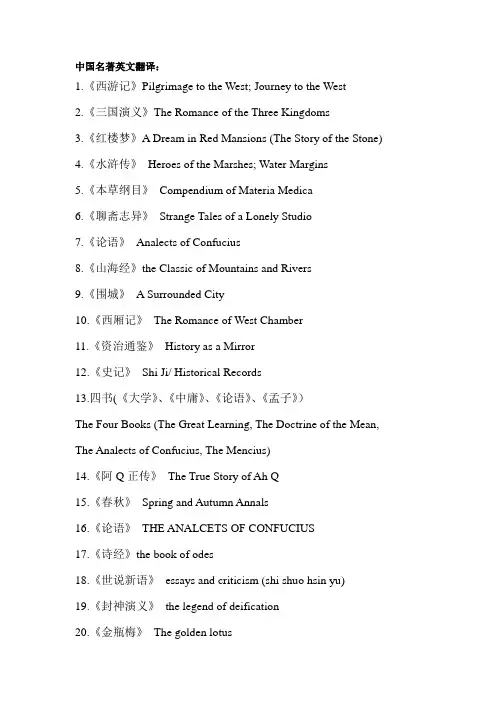
中国名著英文翻译:1.《西游记》Pilgrimage to the West; Journey to the West2.《三国演义》The Romance of the Three Kingdoms3.《红楼梦》A Dream in Red Mansions (The Story of the Stone)4.《水浒传》Heroes of the Marshes; Water Margins5.《本草纲目》Compendium of Materia Medica6.《聊斋志异》Strange Tales of a Lonely Studio7.《论语》Analects of Confucius8.《山海经》the Classic of Mountains and Rivers9.《围城》A Surrounded City10.《西厢记》The Romance of West Chamber11.《资治通鉴》History as a Mirror12.《史记》Shi Ji/ Historical Records13.四书(《大学》、《中庸》、《论语》、《孟子》)The Four Books (The Great Learning, The Doctrine of the Mean, The Analects of Confucius, The Mencius)14.《阿Q正传》The True Story of Ah Q15.《春秋》Spring and Autumn Annals16.《论语》THE ANALCETS OF CONFUCIUS17.《诗经》the book of odes18.《世说新语》essays and criticism (shi shuo hsin yu)19.《封神演义》the legend of deification20.《金瓶梅》The golden lotus21.《西厢记》The west chamber外国名著:1.《飘》Gone with the Wind2.《简。
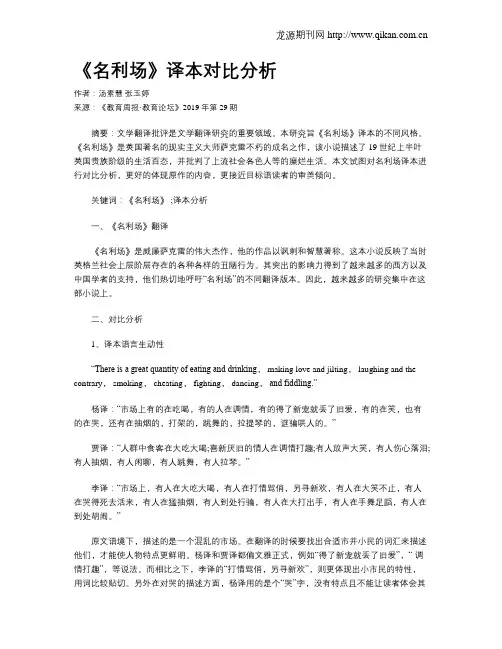
《名利场》译本对比分析作者:汤素慧张玉婷来源:《教育周报·教育论坛》2019年第29期摘要:文学翻译批评是文学翻译研究的重要领域。
本研究旨《名利场》译本的不同风格。
《名利场》是英国著名的现实主义大师萨克雷不朽的成名之作,该小说描述了19世纪上半叶英国贵族阶级的生活百态,并批判了上流社会各色人等的糜烂生活。
本文试图对名利场译本进行对比分析,更好的体现原作的内容,更接近目标语读者的审美倾向。
关键词:《名利场》 ;译本分析一、《名利场》翻译《名利场》是威廉萨克雷的伟大杰作,他的作品以讽刺和智慧著称。
这本小说反映了当时英格兰社会上层阶层存在的各种各样的丑陋行为。
其突出的影响力得到了越来越多的西方以及中国学者的支持,他们热切地呼吁“名利场”的不同翻译版本。
因此,越来越多的研究集中在这部小说上。
二、对比分析1、译本语言生动性“There is a great quantity of eating and drinking, making love and jilting, laughing and the contrary, smoking, cheating, fighting, dancing,and fiddling.”杨译:“市场上有的在吃喝,有的人在调情,有的得了新宠就丢了旧爱,有的在笑,也有的在哭,还有在抽烟的,打架的,跳舞的,拉提琴的,诓骗哄人的。
”贾译:“人群中食客在大吃大喝;喜新厌旧的情人在调情打趣;有人放声大笑,有人伤心落泪;有人抽烟,有人闲聊,有人跳舞,有人拉琴。
”李译:“市场上,有人在大吃大喝,有人在打情骂俏,另寻新欢,有人在大笑不止,有人在哭得死去活来,有人在猛抽烟,有人到处行骗,有人在大打出手,有人在手舞足蹈,有人在到处胡闹。
”原文语境下,描述的是一个混乱的市场。
在翻译的时候要找出合适市井小民的词汇来描述他们,才能使人物特点更鲜明。
杨译和贾译都偏文雅正式,例如“得了新宠就丢了旧爱”,“ 调情打趣”,等说法。
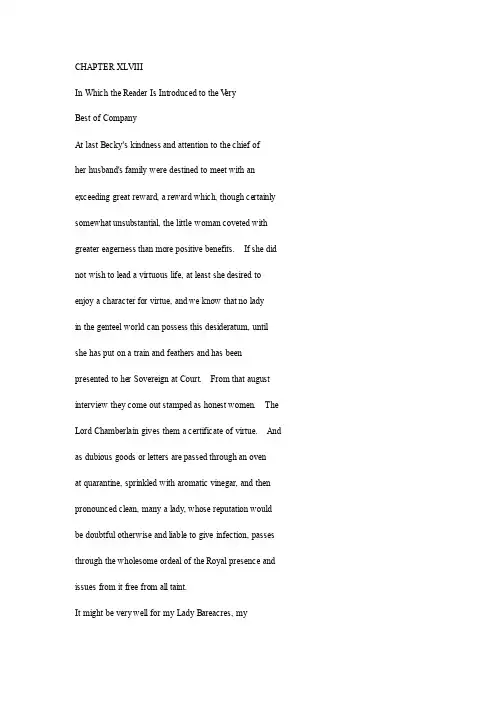
CHAPTER XLVIIIIn Which the Reader Is Introduced to the V eryBest of CompanyAt last Becky's kindness and attention to the chief ofher husband's family were destined to meet with an exceeding great reward, a reward which, though certainly somewhat unsubstantial, the little woman coveted with greater eagerness than more positive benefits. If she did not wish to lead a virtuous life, at least she desired to enjoy a character for virtue, and we know that no ladyin the genteel world can possess this desideratum, until she has put on a train and feathers and has been presented to her Sovereign at Court. From that august interview they come out stamped as honest women. The Lord Chamberlain gives them a certificate of virtue. And as dubious goods or letters are passed through an ovenat quarantine, sprinkled with aromatic vinegar, and then pronounced clean, many a lady, whose reputation would be doubtful otherwise and liable to give infection, passes through the wholesome ordeal of the Royal presence and issues from it free from all taint.It might be very well for my Lady Bareacres, myLady Tufto, Mrs. Bute Crawley in the country, and other ladies who had come into contact with Mrs. Rawdon Crawley to cry fie at the idea of the odious little adventuress making her curtsey before the Sovereign, and to declare that, if dear good Queen Charlotte had been alive, she never would have admitted such an extremelyill-regulated personage into her chaste drawing-room. But when we consider that it was the First Gentleman in Europe in whose high presence Mrs. Rawdon passed her examination, and as it were, took her degree in reputation, it surely must be flat disloyalty to doubt any moreabout her virtue. I, for my part, look back with love and awe to that Great Character in history. Ah, what a high and noble appreciation of Gentlewomanhood there must have been in V anity Fair, when that revered and august being was invested, by the universal acclaim of the refined and educated portion of this empire, with the title of Premier Gentilhomme of his Kingdom. Do you remember, dear M--, oh friend of my youth, how one blissful night five-and-twenty years since, the "Hypocrite" being acted, Elliston being manager, Dowton and Liston performers, two boys had leave from their loyal mastersto go out from Slaughter-House School where they were educated and to appear on Drury Lane stage, amongst a crowd which assembled there to greet the king. THE KING? There he was. Beefeaters were before the august box; the Marquis of Steyne (Lord of the Powder Closet) and other great officers of state were behind the chair on which he sat, HE sat--florid of face, portly of person, covered with orders, and in a rich curling head of hair--how we sang God save him! How the house rocked and shouted with that magnificent music. How they cheered, and cried, and waved handkerchiefs. Ladies wept; mothers clasped their children; some fainted with emotion. People were suffocated in the pit, shrieks and groans rising up amidst the writhing and shouting mass there of his people who were, and indeed showed them- selves almost to be, ready to die for him. Y es, we saw him. Fate cannot deprive us of THA T. Others have seen Napoleon. Some few still exist who have beheld Frederick the Great, Doctor Johnson, Marie Antoinette, &c.--be itour reasonable boast to our children, that we saw George the Good, the Magnificent, the Great.Well, there came a happy day in Mrs. Rawdon Crawley's existence when this angel was admitted into theparadise of a Court which she coveted, her sister-in-law acting as her godmother. On the appointed day, Sir Pitt and his lady, in their great family carriage (just newly built, and ready for the Baronet's assumption of theoffice of High Sheriff of his county), drove up to the little house in Curzon Street, to the edification of Raggles, who was watching from his greengrocer's shop, and saw fine plumes within, and enormous bunches of flowers in the breasts of the new livery-coats of the footmen.Sir Pitt, in a glittering uniform, descended and wentinto Curzon Street, his sword between his legs. Little Rawdon stood with his face against the parlour window- panes, smiling and nodding with all his might to his auntin the carriage within; and presently Sir Pitt issued forth from the house again, leading forth a lady with grand feathers, covered in a white shawl, and holding updaintily a train of magnificent brocade. She stepped into the vehicle as if she were a princess and accustomed all herlife to go to Court, smiling graciously on the footman atthe door and on Sir Pitt, who followed her into thecarriage.Then Rawdon followed in his old Guards' uniform,which had grown woefully shabby, and was much too tight. He was to have followed the procession and waited upon his sovereign in a cab, but that his good-natured sister-in-law insisted that they should be a family party. The coach was large, the ladies not very big, they would hold their trains in their laps--finally, the four went fraternally together, and their carriage presently joinedthe line of royal equipages which was making its way down Piccadilly and St. James's Street, towards the old brick palace where the Star of Brunswick was in waitingto receive his nobles and gentlefolks.Becky felt as if she could bless the people out of the carriage windows, so elated was she in spirit, and so strong a sense had she of the dignified position whichshe had at last attained in life. Even our Becky had her weaknesses, and as one often sees how men pride themselves upon excellences which others are slow to perceive: how, for instance, Comus firmly believes that he is the greatest tragic actor in England; how Brown, thefamous novelist, longs to be considered, not a man of genius, but a man of fashion; while Robinson, the great lawyer, does not in the least care about his reputation in Westminster Hall, but believes himself incomparable across country and at a five-barred gate--so to be, andto be thought, a respectable woman was Becky's aim in life, and she got up the genteel with amazing assiduity, readiness, and success. We have said, there were times when she believed herself to be a fine lady and forgot that there was no money in the chest at home--duns round the gate, tradesmen to coax and wheedle--no ground to walk upon, in a word. And as she went to Court in the carriage, the family carriage, she adopted a demeanour so grand, self-satisfied, deliberate, and imposing that it made even Lady Jane laugh. She walked into the royal apartments with a toss of the head which would have befitted an empress, and I have no doubt had she been one, she would have become the character perfectly..We are authorized to state that Mrs. Rawdon Crawley's costume de cour on the occasion of her presentationto the Sovereign was of the most elegant and brilliantdescription. Some ladies we may have seen--wewho wear stars and cordons and attend the St. James's assemblies, or we, who, in muddy boots, dawdle up and down Pall Mall and peep into the coaches as they drive up with the great folks in their feathers--some ladies of fashion, I say, we may have seen, about two o'clock of the forenoon of a levee day, as the laced-jacketed bandof the Life Guards are blowing triumphal marches seated on those prancing music-stools, their cream-coloured chargers--who are by no means lovely and enticing objects at that early period of noon. A stout countess of sixty, decolletee, painted, wrinkled with rouge up to her drooping eyelids, and diamonds twinkling in her wig, is a wholesome and edifying, but not a pleasant sight. She has the faded look of a St. James's Street illumination, as it may be seen of an early morning, when half the lamps are out, and the others are blinking wanly, as if they were about to vanish like ghosts before the dawn. Such charms as those of which we catch glimpses while her ladyship's carriage passes should appear abroad at night alone. If even Cynthia looks haggard of an afternoon, as we may see her sometimes in the present winter season,with Phoebus staring her out of countenance from the opposite side of the heavens, how much more can old Lady Castlemouldy keep her head up when the sun is shining full upon it through the chariot windows, and showing all the chinks and crannies with which time has marked her face! No. Drawing-rooms should be announced for November, or the first foggy day, or the elderly sultanas of our V anity Fair should drive up in closed litters, descend in a covered way, and make their curtsey to the Sovereign under the protection of lamplight. Our beloved Rebecca had no need, however, of anysuch a friendly halo to set off her beauty. Her complexion could bear any sunshine as yet, and her dress, though if you were to see it now, any present lady of V anity Fair would pronounce it to be the most foolish and preposterous attire ever worn, was as handsome in her eyesand those of the public, some five-and-twenty years since, as the most brilliant costume of the most famous beautyof the present season. A score of years hence that too, that milliner's wonder, will have passed into the domainof the absurd, along with all previous vanities. But we are wandering too much. Mrs. Rawdon's dress waspronounced to be charmante on the eventful day of her presentation. Even good little Lady Jane was forced to acknowledge this effect, as she looked at her kinswoman, and owned sorrowfully to herself that she was quite inferior in taste to Mrs. Becky.9.She did not know how much care, thought, and genius Mrs. Rawdon had bestowed upon that garment. Rebecca had as good taste as any milliner in Europe, and such a clever way of doing things as Lady Jane little understood. The latter quickly spied out the magnificence of the brocade of Becky's train, and the splendour of the lace on her dress.The brocade was an old remnant, Becky said; and asfor the lace, it was a great bargain. She had had it these hundred years.11."My dear Mrs. Crawley, it must have cost a little fortune," Lady Jane said, looking down at her own lace, which was not nearly so good; and then examining the quality of the ancient brocade which formed the material of Mrs. Rawdon's Court dress, she felt inclined to say that she could not afford such fine clothing, but checked that speech, with an effort, as one uncharitableto her kinswoman.12.And yet, if Lady Jane had known all, I think even her kindly temper would have failed her. The fact is, when she was putting Sir Pitt's house in order, Mrs. Rawdon had found the lace and the brocade in old wardrobes,the property of the former ladies of the house, and had quietly carried the goods home, and had suited them to her own little person. Briggs saw her take them, asked no questions, told no stories; but I believe quite sympathised with her on this matter, and so wouldmany another honest woman.13.And the diamonds--"Where the doose did you get the diamonds, Becky?" said her husband, admiring some jewels which he had never seen before and which sparkled in her ears and on her neck with brilliance and profusion. Becky blushed a little and looked at him hard for a moment. Pitt Crawley blushed a little too, and looked out of window. The fact is, he had given her a very small portion of the brilliants; a pretty diamond clasp, which confined a pearl necklace which she wore- and the Baronet had omitted to mention the circumstance tohis lady.15.Becky looked at her husband, and then at Sir Pitt,with an air of saucy triumph--as much as to say, "ShallI betray you?""Guess!" she said to her husband. "Why, you silly man," she continued, "where do you suppose I got them? --all except the little clasp, which a dear friend of mine gave me long ago. I hired them, to be sure. I hired them at Mr. Polonius's, in Coventry Street. Y ou don't suppose that all the diamonds which go to Court belong to the wearers; like those beautiful stones which Lady Jane has, and which are much handsomer than any which I have,I am certain."They are family jewels," said Sir Pitt, again looking uneasy. And in this family conversation the carriage rolled down the street, until its cargo was finally discharged at the gates of the palace where the Sovereign was sitting in state.The diamonds, which had created Rawdon's admiration, never went back to Mr. Polonius, of Coventry Street, and that gentleman never applied for their restoration, butthey retired into a little private repository, in an old desk, which Amelia Sedley had given her years and years ago, and in which Becky kept a number of useful and, perhaps, valuable things, about which her husbandknew nothing. To know nothing, or little, is in the nature of some husbands. To hide, in the nature of how many women? Oh, ladies! how many of you have surreptitious milliners' bills? How many of you have gowns and bracelets which you daren't show, or which you wear trembling?--trembling, and coaxing with smiles the husband by your side, who does not know the new velvet gown from the old one, or the new bracelet from lastyear's, or has any notion that the ragged-looking yellow lace scarf cost forty guineas and that Madame Bobinot is writing dunning letters every week for the money!19.Thus Rawdon knew nothing about the brilliant diamond ear-rings, or the superb brilliant ornament which decorated the fair bosom of his lady; but Lord Steyne, who was in his place at Court, as Lord of the Powder Closet, and one of the great dignitaries and illustrious defences of the throne of England, and came up with allhis stars, garters, collars, and cordons, and paid particular attention to the little woman, knew whence the jewelscame and who paid for them.20.As he bowed over her he smiled, and quoted the hackneyed and beautiful lines from The Rape of the Lock about Belinda's diamonds, "which Jews might kiss and infidels adore.""But I hope your lordship is orthodox," said the littlelady with a toss of her head. And many ladies roundabout whispered and talked, and many gentlemen nodded and whispered, as they saw what marked attention thegreat nobleman was paying to the little adventuress.22.What were the circumstances of the interview between Rebecca Crawley, nee Sharp, and her Imperial Master,it does not become such a feeble and inexperienced penas mine to attempt to relate. The dazzled eyes close before that Magnificent Idea. Loyal respect and decency tell even the imagination not to look too keenly and audaciouslyabout the sacred audience-chamber, but to back away rapidly, silently, and respectfully, making profoundbows out of the August Presence.23.This may be said, that in all London there was no more loyal heart than Becky's after this interview. The name of her king was always on her lips, and he was proclaimed by her to be the most charming of men. She went to Colnaghi's and ordered the finest portrait of him that art had produced, and credit could supply. She chose that famous one in which the best of monarchs is represented in a frock-coat with a fur collar, and breeches and silk stockings, simpering on a sofa from under his curly brown wig. She had him painted in a brooch and wore it--indeed she amused and somewhat pestered heracquaintance with her perpetual talk about his urbanity and beauty. Who knows! Perhaps the little woman thought she might play the part of a Maintenon or a Pompadour.But the finest sport of all after her presentation was tohear her talk virtuously. She had a few female acquaintances, not, it must be owned, of the very highest reputationin V anity Fair. But being made an honest woman of,so to speak, Becky would not consort any longer withthese dubious ones, and cut Lady Crackenbury when the latter nodded to her from her opera-box, and gave Mrs. Washington White the go-by in the Ring. "One must, my dear, show one is somebody," she said. "One mustn't be seen with doubtful people. I pity Lady Crackenbury from my heart, and Mrs. Washington White may be a verygood-natured person. YOU may go and dine with them,as you like your rubber. But I mustn't, and won't; andyou will have the goodness to tell Smith to say I am notat home when either of them calls."The particulars of Becky's costume were in the newspapers--feathers, lappets, superb diamonds, and all therest. Lady Crackenbury read the paragraph in bitternessof spirit and discoursed to her followers about the airswhich that woman was giving herself. Mrs. Bute Crawley and her young ladies in the country had a copy of the Morning Post from town, and gave a vent to their honestindignation. "If you had been sandy-haired, green-eyed,and a French rope-dancer's daughter," Mrs. Bute saidto her eldest girl (who, on the contrary, was a veryswarthy, short, and snub-nosed young lady), "Y ou mighthave had superb diamonds forsooth, and have beenpresented at Court by your cousin, the Lady Jane. But you'reonly a gentlewoman, my poor dear child. Y ou have onlysome of the best blood in England in your veins, andgood principles and piety for your portion. I, myself,the wife of a Baronet's younger brother, too, neverthought of such a thing as going to Court--nor wouldother people, if good Queen Charlotte had been alive."In this way the worthy Rectoress consoled herself, andher daughters sighed and sat over the Peerage all night.译文蓓基对于克劳莱的一家之主那一番关切和殷勤,总算得到了极大的酬报。
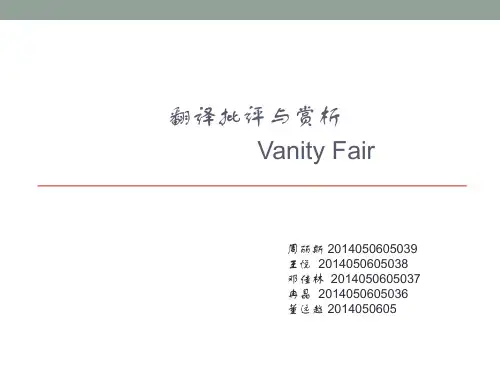

《名利场》原文片段与译文赏析中国古典小说《名利场》是明朝笔墨著名作家陆游的代表作。
小说以京城为背景,主要讲述了英雄曹策一心追求得道取名的典型故事。
下面来读读小说中的一段原文,并欣赏一下这段文字的精彩译文。
原文:“一来到了京城,曹策发现满城繁荣。
九宫宫门,飞檐走壁,五彩缤纷,精致绝伦;人流参差,嘈杂不绝;群芳争艳,忙忙碌碌;一派繁华热闹,此起彼伏,令人啧啧称奇。
”译文:一到京城,曹策发现这里非常繁华。
他看到九宫宫门,檐上在走走停停;五彩斑斓,雕刻精美;人们来来去去,喧哗不止;各种鲜花美妙绝伦;四处热闹,繁荣多姿,令人惊叹不已。
该段文字描绘的是明朝繁华的京城,拥有的繁复景象让人眼前一亮,令人赞叹不已。
九宫宫门,檐上的走走停停,五彩斑斓精致的雕刻,现代人看到这样的景象可能有些难以想象,但正是这些特点使得明朝的京城更加可贵而著名。
小说细节处处流露出明朝社会的复杂性,不仅有分层析构,更描绘出各个阶层之间的联系。
陆游著重人物性格的描写,给出了他对明朝人文发展的审视。
朝廷权贵英明壮丽,但也有暴躁易怒的一面;贵族子弟的智慧与胆略,但也有好斗姓氏的宿命;而且也有山野风趣的山民,令人感到不可思议。
这种看似复杂的人性混杂,也正是《名利场》令人难忘的地方。
此外,《名利场》还把古人对名利成神的崇拜牢牢描绘出来,这种信仰为中国人崇拜名利,抱拥着创造一番大事业的理想而付出努力提供了源动力。
从曹策以及其他人物的追求中,可以看出中国古人对名利的热爱以及追求。
由此可见,陆游的《名利场》着实能令人叹为观止。
该书以宏大的叙事结构,淋漓尽致地描绘了明朝人文发展的时代背景,令人着迷。
它深刻揭示了人性的复杂性,也正是这种复杂性使《名利场》成为中国古典小说的经典之作。
综上所述,《名利场》是明朝笔墨著名作家陆游代表作,以京城为背景,主要讲述了英雄曹策一心追求得道取名的典型故事,以及古人对名利成神的崇拜。
该书以宏大的叙事结构,淋漓尽致地描绘了明朝人文发展的时代背景,通过人物塑造,深刻揭示了人性的复杂性,着实能令人叹为观止,是中国古典小说的经典之作。
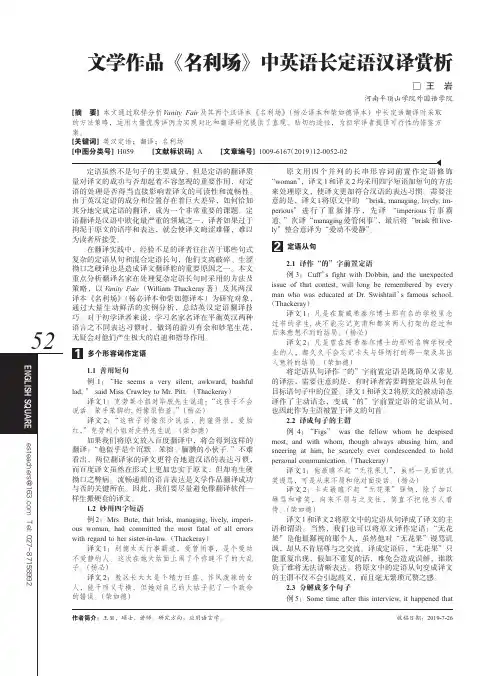
量对译文的成功与否却起着不容忽视的重要作用,对定语的处理是否得当直接影响着译文的可读性和流畅性。
由于英汉定语的成分和位置存在着巨大差异,如何恰如其分地完成定语的翻译,成为一个非常重要的课题。
定语翻译是汉语中欧化最严重的领域之一,译者如果过于拘泥于原文的语序和表达,就会使译文晦涩难懂,难以为读者所接受。
在翻译实践中,经验不足的译者往往苦于那些句式复杂的定语从句和混合定语长句,他们支离破碎、生涩拗口之硬译也是造成译文翻译腔的重要原因之一。
本文重点分析翻译名家在处理复杂定语长句时采用的方法及策略,以Vanity Fair (William Thackeray 著)及其两汉译本《名利场》(杨必译本和荣如德译本)为研究对象,通过大量生动鲜活的实例分析,总结英汉定语翻译技巧。
对于初学译者来说,学习名家名译在平衡英汉两种语言之不同表达习惯时,做到的游刃有余和妙笔生花,无疑会对他们产生极大的启迪和指导作用。
1多个形容词作定语1.1善用短句例1:“He seems a very silent,awkward,bashful lad,”said Miss Crawley to Mr.Pitt.(Thackeray )译文1:克劳莱小姐对毕脱先生说道:“这孩子不会说话。
笨手笨脚的,好像很怕羞。
”(杨必)译文2:“这孩子好像很少说话,拘谨得很,爱脸红,”克劳利小姐对皮特先生说。
(荣如德)如果我们将原文放入百度翻译中,将会得到这样的翻译:“他似乎是个沉默、笨拙、腼腆的小伙子。
”不难看出,两位翻译家的译文更符合地道汉语的表达习惯,而百度译文虽然在形式上更加忠实于原文,但却有生硬拗口之弊病。
流畅通顺的语言表达是文学作品翻译成功与否的关键所在。
因此,我们要尽量避免像翻译软件一样生搬硬套的译文。
1.2妙用四字短语例2:Mrs.Bute,that brisk,managing,lively,imperi-ous woman,had committed the most fatal of all errors with regard to her sister-in-law.(Thackeray )译文1:别德太太行事霸道,爱管闲事,是个爱动不爱静的人。
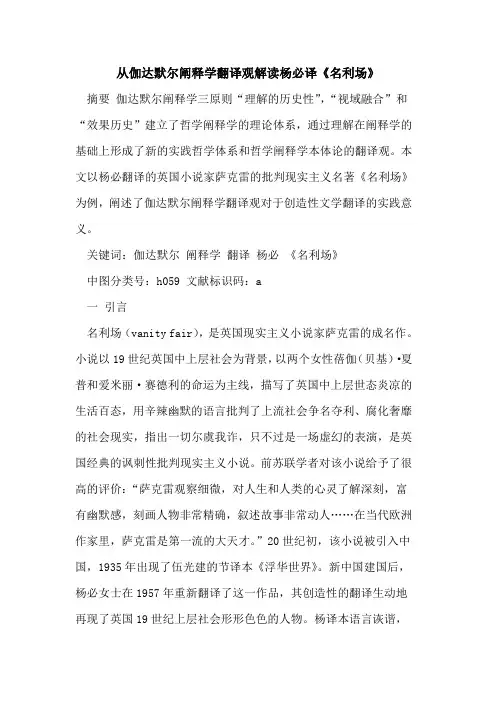
从伽达默尔阐释学翻译观解读杨必译《名利场》摘要伽达默尔阐释学三原则“理解的历史性”,“视域融合”和“效果历史”建立了哲学阐释学的理论体系,通过理解在阐释学的基础上形成了新的实践哲学体系和哲学阐释学本体论的翻译观。
本文以杨必翻译的英国小说家萨克雷的批判现实主义名著《名利场》为例,阐述了伽达默尔阐释学翻译观对于创造性文学翻译的实践意义。
关键词:伽达默尔阐释学翻译杨必《名利场》中图分类号:h059 文献标识码:a一引言名利场(vanity fair),是英国现实主义小说家萨克雷的成名作。
小说以19世纪英国中上层社会为背景,以两个女性蓓伽(贝基)·夏普和爱米丽·赛德利的命运为主线,描写了英国中上层世态炎凉的生活百态,用辛辣幽默的语言批判了上流社会争名夺利、腐化奢靡的社会现实,指出一切尔虞我诈,只不过是一场虚幻的表演,是英国经典的讽刺性批判现实主义小说。
前苏联学者对该小说给予了很高的评价:“萨克雷观察细微,对人生和人类的心灵了解深刻,富有幽默感,刻画人物非常精确,叙述故事非常动人……在当代欧洲作家里,萨克雷是第一流的大天才。
”20世纪初,该小说被引入中国,1935年出现了伍光建的节译本《浮华世界》。
新中国建国后,杨必女士在1957年重新翻译了这一作品,其创造性的翻译生动地再现了英国19世纪上层社会形形色色的人物。
杨译本语言诙谐,用词准确,行文流畅自然,最大限度地保留了原作的风格。
哲学阐释学之父伽达默尔曾经指出“文学作品的真正存在只在于被展现的过程。
作品只有通过在创造或再现而使自身达到表现”。
杨必译的《名利场》赋予了原作新的生命力,使其成为文学翻译的范本。
学者李端严在谈及杨必译《名利场》时,曾指出其“达到了译作的较高境界:忠而不泥,活而不滥”。
本文试图以伽达默尔哲学阐释学的三原则,从本体论的角度来重新解读《名利场》杨必译本。
二伽达默尔的哲学阐释学翻译观阐释学(hermeneutics),起源于古希腊和中世纪,19世纪形成了一门独立的学科,原本是一种旨在理解文本意义的方法论。
从汉英语言差异看《名利场》的汉译摘要《名利场》是十九世纪英国批判现实主义作家威廉·梅克比斯·萨克雷的成名之作。
本文从汉英语言差异角度出发,着重对杨必的译本与贾文浩和贾文渊先生的重译本进行对比赏析,从英汉的修辞手法、语言特征、思维模式、文化习俗等角度出发,对比分析了杨译本和贾译本中特有的翻译风格,以及各自的精妙和不足之处,更好地体现原作的熠熠生辉。
关键词《名利场》;汉英语言对比;对比赏析翻译的历史由来已久,很多学者都提出了许多的翻译原则和标准,比如我们熟知的功能对等理论,汉英语言差异,严复的“信达雅”,钱钟书的“化境”说等等,这些都为我们进行翻译批评和鉴赏提供了理论支持[1]。
因为《名利场》是国文学史上一篇著名的小说,所以对其译本的考究意义深远。
小说是以刻画人物形象为中心,通过完整的故事情节和环境描写来反映社会生活的文学体裁。
因此,对于小说的翻译,不仅要符合语言的规则,还要译出原作想要表现出来的社会生活,使原文与译文在文字层面和内涵层面能够高度统一。
《名利场》有两个译本,本文选取的是杨必以及贾文浩和贾文渊先生的重译本。
杨必先生译道高明,用词精练,语言功底深厚,使译作具有中国古典白话小说的遗风。
贾文浩和贾文渊先生则是站在巨人的肩膀上,融入新时代的文化元素,采用异化的手法以体现原文的风采。
语言忠实于原文,尽可能的传达出了原作的风采。
语言是文化的载体,文化差异反映到语言层面则表现为语言差异。
(廖国强,夏宏钟,2007)[2]英语和汉语两种语言有着较大的差异,主要体现在思维模式、文化习俗、历史背景等方面,因此英语和汉语的句式结构同样存在差异。
本文从英汉句子结构的差异出发,对比赏析两个译作。
1 形合与意合英语注重形合,而汉语注重意合。
(连淑能,1993)[3]英语是合成式的语言,其自身的语法手段成为句子结构的主要依靠,在英语句子中,主要依靠词语和句子在意义上的连贯与逻辑顺序而连词成句。
汉语是叠加式的语言。
2018年50期总第438期ENGLISH ON CAMPUS杨必翻译风格微探——以《名利场》的翻译为例文/刘琨小说《名利场》是十九世纪英国现实主义作家萨克雷(William Thackeray)的成名作,也是其最为人称道的著作。
在这部作品中,作者着重刻画了两个性格迥异的女子,通过对于她们不同的人生经历与命运的生动描写,展示了十九世纪英国中、上流社会各色人等,从而勾勒出一幅名利场上的讽刺画卷。
作者萨样一部文学名著的艺术意境准确而优雅地移植到汉语中来, 要求中文译者不仅要有高超的英汉语造诣, 还必须具备高度的艺术修养以及严密的逻辑思维能力。
因此多年来这部倍受喜爱的名著有过诸多中文译本,而其中最为人喜爱、最广受好评的是已故译界前辈杨必女士留下的译本。
【摘要】取材于英国十九世纪中上层社会的经典小说《名利场》,活灵活现地描写了当时英国的名利场中形形色色的人物,原作者极尽其讽刺之能事,把人物刻画得栩栩如生、惟妙惟肖。
而杨必女士翻译的《名利场》中文版不但表词语上表达灵活,不拘泥于原文句式,而且行文流畅,完美忠实地再现了原文风格和文体。
【关键词】《名利场》;杨必 ;翻译技巧【作者简介】刘琨(1984.03-),女,汉族,山东威海人,安徽农业大学,翻译硕士,讲师,研究方向:翻译学、外语教学。
翻译的时候应该着重考虑文化的差异,比如说中国的“蓝天牌牙膏”,在中国有蓝天白云的美好寓意,但是如果一字不差的照译过去“Blue Sky Toothpaste”就不是很妥当,因为国外的商务英语文化当中,“blue-sky”表示“无价值的,不保险的”,这样很可能会影响产品的销售。
当然也有翻译成功的例子,比如说“Goldlion”就是一个成功的例子,并没有一字不差的照译为“金狮”,而是翻译成“金利来”,“Gold”翻译为金,“lion”音译为利来,不仅寓意提升了许多,而且其形象变得很辉煌高大。
当然还有全球著名的运动品牌“Reebok”并没有直译为“短角羚(南非)”,而是基于中国的文化背景,翻译为“锐步”,不仅比“短角羚(南非)”形象,而且朗朗上口,符合品牌轻盈快捷的特点,在中国市场上也占据了很重要的地位。
《名利场》杨必译本赏析作者:崔贝贝来源:《校园英语·中旬》2016年第02期【摘要】《名利场》是英国著名批判现实主义作家萨克雷的成名之作。
翻译家杨必先生的中译本用准确、流畅、地道的语言,创造性地再现了原文的艺术魅力。
在翻译过程中,译者采用了多种翻译方法,准确地遣词造句,准确把握了原文内容及艺术风格。
本文主要从翻译方法、措辞及风格方面对杨译本作了简要的赏析。
【关键词】《名利场》翻译方法措辞风格《名利场》辛辣地讽刺了买卖良心和荣誉的“名利场”中的各种丑恶现象,是一部现实主义的杰作。
而国外优秀作品的引入往往离不开优秀的翻译,译者不仅要有高超的语言功底,还必须具备高度的文学修养、敏锐的艺术直觉以及严密的逻辑思维能力。
译界前辈杨必先生留下的《名利场》中译本准确流畅,选词精当,色调鲜明,完美地展现了原作的风格神韵,堪称译界典范。
本文将从翻译方法、措辞以及艺术风格等方面对杨必先生的《名利场》译本进行简要评析。
一、从翻译方法分析1.分句。
例1:While the present century was in its teens, and on one sunshiny morning in June, there drove up to the great iron gate of Miss Pinkerton's academy for young ladies, on Chiswick Mall, a large family coach, with two fat horses in blazing harness, driven by a fat coachman in a three-cornered hat and wig, at the rate of four miles an hour.译文:当时我们这世纪刚开始了十几年。
在六月里的一天早上,天气晴朗,契息克林荫道上平克顿女子学校的大铁门前面来了一辆宽敞的私人马车。
从杨必译著《名利场》看文学翻译的科学性和艺术性论文二十世纪六十年代以来,篇章语言学兴起,语篇连贯性被逐步引入翻译研究中。
德国语言学、翻译学家沃尔夫拉姆·威尔斯将翻译过程分为两个阶段:理解阶段和重构阶段。
文学翻译当然也不例外。
在文学翻译实践中,我逐渐认识到,文学翻译不同于科技和法律翻译,有自己的特点,并且在文学翻译重构阶段遵循一套特有的原则。
目前,中国德语译者和翻译学学生都急需掌握一套实用的翻译理论。
以下是店铺为大家精心准备的:从杨必译著《名利场》看文学翻译的科学性和艺术性相关论文。
内容仅供参考,欢迎阅读!从杨必译著《名利场》看文学翻译的科学性和艺术性全文如下:摘要:《名利场》是英国19世纪小说家威·梅·萨克雷的成名之作,在这部小说里,作者充分发挥了他那极富幽默的天赋和善于讽刺的才能,“用逼真而动人的文笔,揭露出政治和社会上的真相—马克思”,反映了英国19世纪中上层社会各色人等的丑恶嘴脸。
小说妙趣横生,发人深省。
文章立足于解读杨必译著《名利场》,提出文学翻译在不能脱离科学性的基础上,更应重视它的艺术性的观点。
翻译包括文学翻译究竟是科学,还是艺术?关于这个问题的论争,由来已久。
本文并不想对引起这一论争的原因及内容再做赘述,笔者赞成刘宓庆先生在《翻译美学导论》中提出的观点“翻译兼具科学性与艺术性,而以科学性为基本属性,而这个基本属性又必须伴随翻译的艺术性,因为翻译的艺术性是它独具特色的、不可或缺的基本功能。
”文学翻译中这两种截然不同的价值取向,涉及到译者在翻译中的创造性可以容许到多大程度这一重大问题。
众所周知,《名利场》是英国十九世纪小说家威?梅?萨克雷的成名之作,在这部小说里,作者充分发挥了他那极富幽默的天赋和善于讽刺的才能,“用逼真而动人的文笔,揭露出政治和社会上的真相―马克思”,反映了英国19世纪中上层社会各色人等的丑恶嘴脸。
小说妙趣横生,发人深省。
而杨必翻译的《名利场》所以能获得翻译界的一致好评,原因也正在于杨译用地道、流畅的汉语,忠实地传达了原作幽默、讽刺的意味,再现了作者的思想倾向。